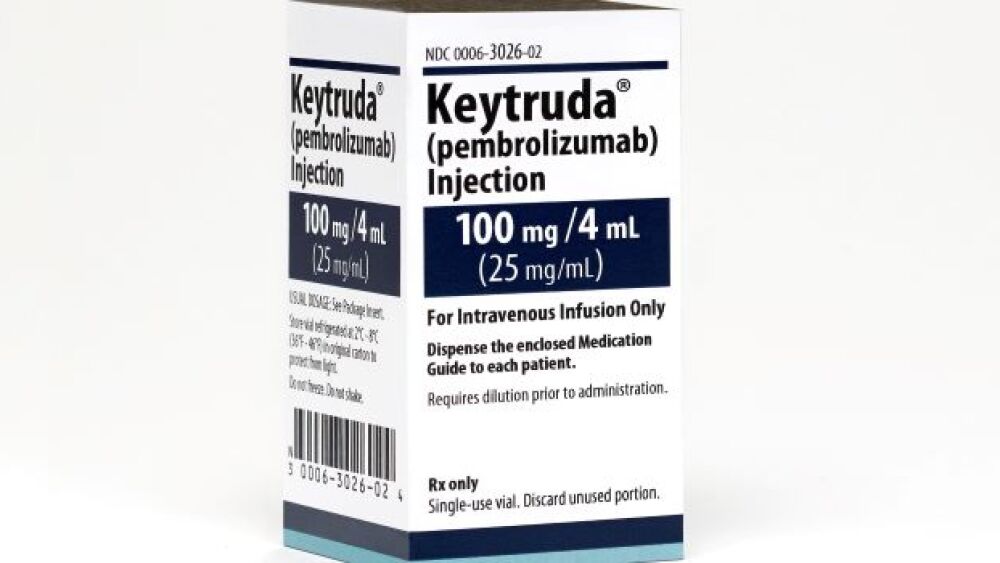The U.S. FDA greenlit the combination of Keytruda and Eisai’s Lemvima as a first-line treatment for adult patients with advanced renal cell carcinoma.
Copyright © 2009-2021 Merck Sharp & Dohme Corp., a subsidiary of Merck & Co., Inc., Kenilworth, N.J., U.S.A. All rights reserved.
Merck’s vaunted checkpoint inhibitor Keytruda racked up another regulatory win. On Wednesday, the U.S. Food and Drug Administration greenlit the combination of Keytruda and Eisai’s Lemvima as a first-line treatment for adult patients with advanced renal cell carcinoma (RCC).
The approval was based on data from the Phase III CLEAR/KEYNOTE-581 study that showed Keytruda and Lenvima, an oral multiple receptor tyrosine kinase inhibitor, demonstrated statistically significant improvements in progression-free survival (PFS), overall survival, and confirmed objective response rate compared to Pfizer’s Sutent (sunitinib), the standard-of-care for first-line RCC. Patients in the study were enrolled regardless of PD-L1 tumor expression status.
The median age of patients in the Phase III study was 62 years, with a range from 29 to 88 years old.
The FDA’s decision was made under the agency’s Real-Time Oncology Review (RTOR) pilot program, which seeks to improve the efficiency of the review process for applications in order to ensure that treatments are available to patients as quickly as possible.
Study data showed that the combination reduced the risk of disease progression by 61%. Patients saw a median PFS of 23.9 months compared to 9.2 months for Sutent. For Overall Survival (OS), the combination reduced the risk of death by 34% compared to the Pfizer medication.
Additionally, Keytruda and Lenvima achieved a complete response rate of 16% and a partial response (PR) rate of 55%. That was compared to a total response rate of 4% and a PR rate of 32% for patients who received Sutent.
While the efficacy of the combination therapy is positive, there were a high number of serious adverse events in the study population. The companies said 51% of patients experienced such events. The reactions included diarrhea, hypertension, myocardial infarction, pneumonitis, acute kidney injury, pneumonia, and others.
Gregory Lubiniecki, vice president of Oncology Clinical Research at Merck Research Laboratories, said the approval reinforces the potential union of Keytruda and Lenvima in oncology. The combination was previously approved for the treatment of patients with advanced endometrial carcinoma.
“At Merck, we are focused on delivering meaningful innovations that extend the lives of people with cancer. We are proud to see how our collaboration with Eisai can now help to improve survival outcomes for patients with advanced renal cell carcinoma and are committed to further exploring Keytruda plus Lenvima in other difficult-to-treat cancers,” Lubiniecki said in a statement.
Takashi Owa, chief medicine creation and chief discovery officer of Eisai’s Oncology Business Group, said the FDA approval of Keytruda and Lenvima is significant for the advanced renal cell carcinoma community. It is estimated that approximately 30% of kidney cancer patients will have metastatic disease when diagnosed. Survival is dependent on the stage of disease at diagnosis.
The five-year survival rate for metastatic disease patients is 13%. Owa said the data from the Phase III study shows the combination demonstrated superior outcomes against the Pfizer drug.
“This milestone is a testament to our dedication to developing new therapeutic options for people living with advanced cancers, which is fueled by our passion for aiming to improve cancer care for patients, and amplified by the teamwork resulting from our collaboration with Merck,” Owa said in a statement.





